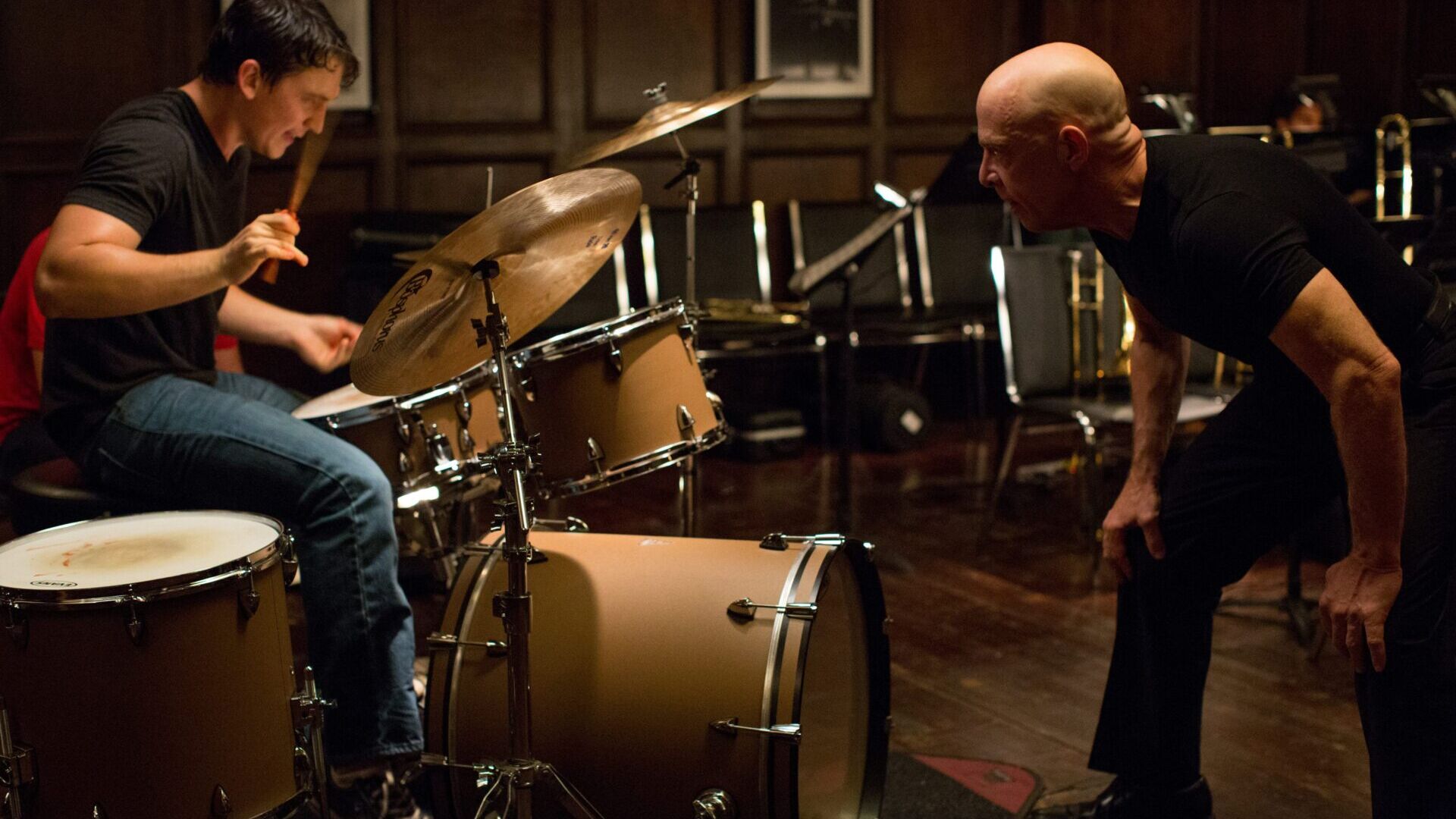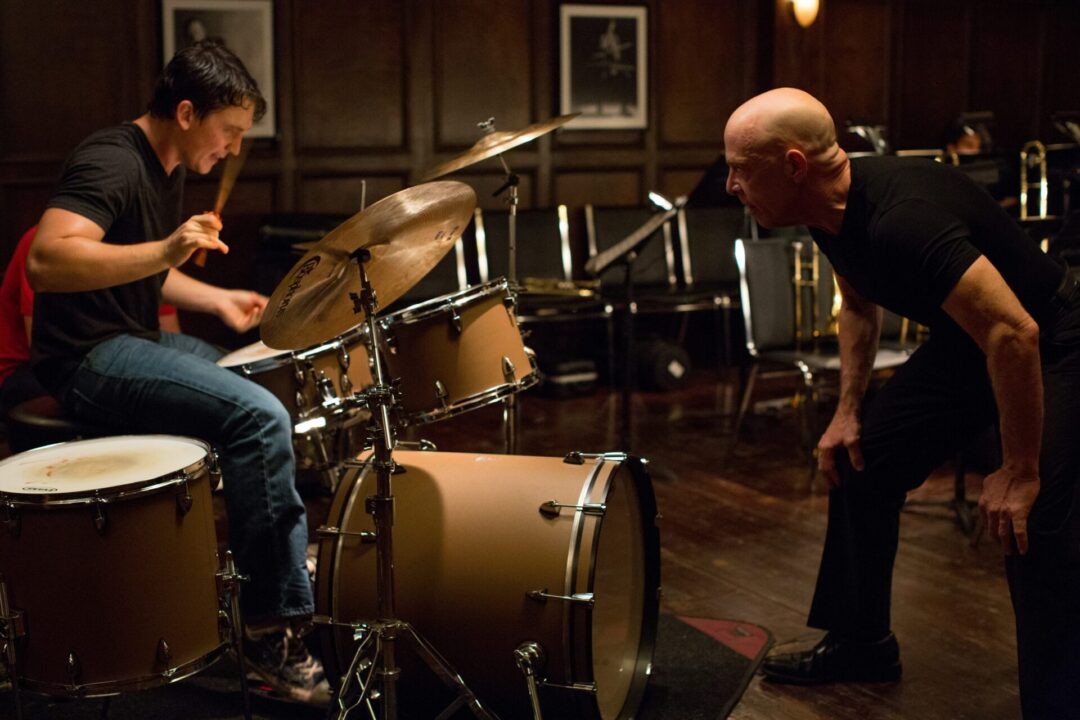As films about music and musicians go, largely split between being dramatic biopics of a naive star navigating the turbulent waters of the industry itself or all-out pop-heavy musical celebrations, most have revered ‘music’ and regarded it in its most magisterial of ways. Characters’ all-consuming torment or glee is typically played against its beautiful, romantic, and purified sonic elements to elevate the bigger, surrounding drama. It might be safe to say, however, that these filmmakers didn’t play in the same demanding high-school music orchestra that second-time feature film director Damien Chazelle did. And what he learned there, was that music is nothing near related to “being safe.”
A former jazz student drummer himself, Chazelle writes and directs the heart-pounding semi-autobiographical film, Whiplash (this year’s Sundance Grand Prize Jury winner, the festival’s highest award), about a similarly dedicated undergrad musician, whose discovery by the school’s eccentric, if not outright hostile jazz ensemble instructor at the school’s East coast music conservatory leads to a relentless obsession that pushes the boundaries of how far one will go, and how much one will endure, to achieve greatness. Chazelle, in a Director’s Statement about the film, says, “There are a lot of movies about the joy of music. But as a young drummer in a conservatory high school jazz orchestra, the emotion I felt the most frequently was a different one: fear. Fear of missing a beat. Fear of losing tempo. Most overwhelmingly, fear of my conductor.”
Check out our interview coverage with Miles Teller, J.K. Simmons, and Damien Chazelle, on Whiplash
From a voided black splash, our first sensory cue is the lone, echoing build of a snare drum. A single hit, like a gunshot, followed by another, and then by another, in ever-quickening measurement, culminates in a drum roll that sees jazz drummer Andrew (Miles Teller) playing in the school’s practice room. As an ominous ghostly presence in slim-fitting all-black wears, Terence Fletcher (J.K. Simmons), head cue-balled, arms toned, and eyes unwavering, immediately barks drum beats for Andrew to play back perfectly. The mechanics of this scene alone, and serving as the film’s opening, set the tension-filled operatic stage that is doomed to meet tormenting and self-sacrificing proportions.
From there, it’s a film ablaze, where the next day Andrew is singularly plucked from being an “alternate,” turning the sheet music pages for the “core” drummer and transferred into Terence’s distinguished performance jazz ensemble as the lead drummer. Inspired and drawn in by Terence’s initial warm-heartedness, Andrew finds that his too-good-to-be-true opportunity proves to be just that; in a dizzyingly-instant moment, he is blind-sighted by his instructor’s immediate trial-by-fire teaching method, by way of hurling a drum-cymbal at his just-off-tempo drummer’s head. Scenes of Terence spitting venom at his newly petrified protege take on ever-increasing suspense and tension, as head-spinning camera whip-pans and quick-cut editing nearly overwhelm and suffocate the audience’s senses, a hypnotic and consuming experience of sweat, blood, tears, and paranoia.
I can say with total confidence that you won’t see another movie so directorially confident from any other first time director this year.
The fast-rising Teller, whose earlier and smaller star-making billings (The Spectacular Now) are quickly getting replaced with bigger studio projects (his ‘Mr. Fantastic’ in Marvel’s The Fantastic Four reboot is slated to come out next year) is able to show off his most sincere and honest acting chops, as well as a further dedication to the craft with this demanding role that sees him trading his cool guy charisma with a more reserved, laser-focused determination, with solemn inner-willing of wanting to be the next Charlie Parker, to be the best jazz drummer ever. Teller further impresses in this role that sees his character’s incredible journey and range, from seething frustration, weeping angst, and a physical embodiment complete with bloodied raw hands and sweat-pouring exhaustion, bringing his real-life drumming experience to perform the film’s incredible musical numbers himself.
However, the meat of the movie is in the crucially necessary performance needed from Simmons, who more than rises to this occasion. His comically gruff groucho persona wades deep into the thickness of vitriol-laced contempt for all who dare defy his expectations, making him the most transfixing and fear-making element of the movie.
Visually, and at its very best, Whiplash takes the eery yellowed and greened colors and ominously foreboding camerawork reminiscent of The Social Network, mixed with two heavy parts paranoia and obsession, served neatly as a devilish and spiraling-mad cocktail. How many more ways do I have to say, just go see this movie already?
Whiplash should be further praised for being the gripping and original screenplay that it is, which Chazelle and company shot in a brisk nineteen days. This breakneck shooting schedule is successfully felt onscreen, with a rushed momentum that propels the movie forward, creating and heightening stakes in its second and third acts, and resulting in an all-out blitzkrieg of movie endings in one of the most cathartic of grand finales, taking place in Carnegie Hall. I can say with total confidence that you won’t see another movie so directorially confident from any other first second time director this year. Chazelle’s Whiplash, like the art of drumming, delivers precise and hard hits, moving from quieter moments of stolen vulnerability to blistering and primal rampage. And when it’s over, all you’ll hear is the silent echo of what you will still be wondering was controlled chaos, and what was not.
‘Whiplash’ is in theaters this Friday.
*Update: An earlier version of this review incorrectly listed Whiplash as being Damien Chazelle’s first feature film. It is his second.
Ryan Rojas
Ryan is the editorial manager of Cinemacy, which he co-runs with his older sister, Morgan. Ryan is a member of the Hollywood Critics Association. Ryan's favorite films include 2001: A Space Odyssey, The Social Network, and The Master.


